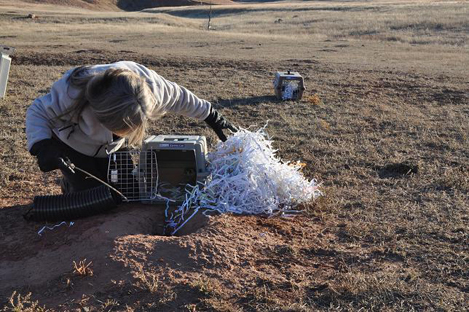| << Chapter < Page | Chapter >> Page > |
For example, Karner blue butterfly larvae form mutualistic relationships with ants. Mutualism is a form of a long-term relationship that has coevolved between two species and from which each species benefits. For mutualism to exist between individual organisms, each species must receive some benefit from the other as a consequence of the relationship. Researchers have shown that there is an increase in the probability of survival when Karner blue butterfly larvae (caterpillars) are tended by ants. This might be because the larvae spend less time in each life stage when tended by ants, which provides an advantage for the larvae. Meanwhile, the Karner blue butterfly larvae secrete a carbohydrate-rich substance that is an important energy source for the ants. Both the Karner blue larvae and the ants benefit from their interaction.
Ecosystem ecology is an extension of organismal, population, and community ecology. The ecosystem is composed of all the biotic components (living things) in an area along with the abiotic components (non-living things) of that area. Some of the abiotic components include air, water, and soil. Ecosystem biologists ask questions about how nutrients and energy are stored and how they move among organisms and the surrounding atmosphere, soil, and water.
The Karner blue butterflies and the wild lupine live in an oak-pine barren habitat. This habitat is characterized by natural disturbance and nutrient-poor soils that are low in nitrogen. The availability of nutrients is an important factor in the distribution of the plants that live in this habitat. Researchers interested in ecosystem ecology could ask questions about the importance of limited resources and the movement of resources, such as nutrients, though the biotic and abiotic portions of the ecosystem.

Visit this site to see Stephen Wing, a marine ecologist from the University of Otago, discuss the role of an ecologist and the types of issues ecologists explore.
Ecology is the study of the interactions of living things with their environment. Ecologists ask questions across four levels of biological organization—organismal, population, community, and ecosystem. At the organismal level, ecologists study individual organisms and how they interact with their environments. At the population and community levels, ecologists explore, respectively, how a population of organisms changes over time and the ways in which that population interacts with other species in the community. Ecologists studying an ecosystem examine the living species (the biotic components) of the ecosystem as well as the nonliving portions (the abiotic components), such as air, water, and soil, of the environment.

Notification Switch
Would you like to follow the 'University of georgia biology' conversation and receive update notifications?